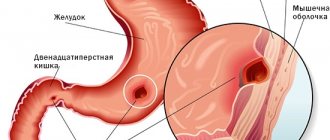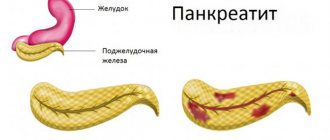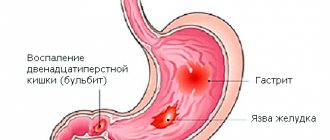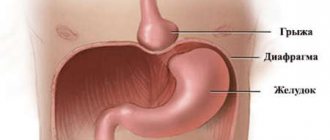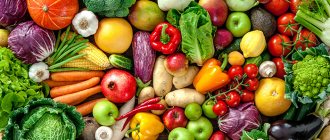Description of the disease
Gastric achylia (in the narrow sense of the word) is a pathological condition associated with a violation of the secretory function of the stomach, characterized by the absence of pepsin, a gastric enzyme that breaks down dietary proteins. This condition is preceded by achlorhydria - cessation of hydrochloric acid production. Hydrochloric acid not only promotes the conversion of pepsinogen produced by stomach cells into pepsin, but also ensures the activity of the latter. Therefore, gastric achylia usually means the complete absence of its secretions, including both enzymes and hydrochloric acid.
Structure of the stomach
Which doctor should I contact?
If a person experiences unpleasant symptoms associated with digestion, they should visit a gastroenterologist. He may additionally go to other specialized specialists, such as a physiotherapist and nutritionist. To identify the cause of the disease, you will need the help of an immunologist, endocrinologist, nephrologist (if renal failure is present). Everything will depend on the presence of various symptoms.
Therapy is provided by gastroenterology centers. For example, in St. Petersburg:
- Medem is a multidisciplinary network of clinics. St. Marata, 6.
- Gastroenterological. st. Pionerskaya, 16.
- Medical. Sredny prospect V.O., no. 17.
- "Jerusalem". V. O. 4th Line, no. 41A.
In Moscow:
- Scientific Center (TsNIIG) (Entuziastov Highway, 86).
- Medical center in Maryino, st. Lyublinskaya, 104.
Types of gastric achylia
Termination of the secretory function of the stomach can be associated both with damage to the cells that synthesize hydrochloric acid and enzymes, and with a violation of the regulation of gastric digestion at the neurohumoral level. Depending on the mechanism of development, the pathology is classified as follows:
- functional achylia;
- idiopathic achylia;
- organic achilia.
The last two types can be classified as histamine-resistant achylia.
There are no clear distinctions between functional and organic achylia: a functional disorder may be accompanied by more or less pronounced organic lesions.
Functional
This type of pathology develops against the background of unchanged cells of the gastric mucosa and is associated with a violation of the regulation of gastric secretion. With functional achylia, the cells are capable of producing a specific secretion, but temporarily cease activity due to the lack of hormonal stimulation.
Normally, food entering the stomach causes the release of hormones (histamine, gastrins), which activate the synthesis of hydrochloric acid and pepsinogen. When exposed to certain factors, the mechanism of hormonal regulation malfunctions, and the secretion of gastric cells stops.
Functional achylia is a transient condition. At different periods, the acidity of gastric juice in patients can either be restored to normal or increase.
Idiopathic
This type of achylia also occurs in the absence of damage to the gastric mucosa, but is associated not with hormonal disorders, but with the congenital failure of the glands that synthesize hydrochloric acid and enzymes. In such patients, the secretion of gastric juice is not able to normalize.
Organic
The pathology is caused by damage to the gastric mucosa containing the digestive glands under the influence of pathogenic factors.
In mild cases, cell regeneration and normalization of gastric acidity are possible. In severe cases, with extensive and chronic lesions, this pathology is irreversible.
Achylia with residual gastric secretory capacity is a condition characterized by the preservation of a certain number of intact cells of the gastric mucosa that are able to function normally.
Histamine-resistant
In the absence of acid and enzyme formation in response to histamine stimulation, Achilia is considered histamine-resistant (histamine-resistant).
In the case of idiopathic achylia, the cells are insensitive to such stimulation, and in organic achylia, the glands are simply destroyed.
In newborns, achylia is considered normal in the first two weeks of life.
Causes
Factors leading to disruption of hormonal regulation of gastric secretion and functional achylia include:
- eating dry food, swallowing food in chunks, without chewing thoroughly;
- diet errors - excessive consumption of refractory fats (lamb, beef), carbohydrates with a high glycemic index (fresh baked goods, pasta, sweets, steamed cereals);
- prolonged fasting;
- non-compliance with diet, overeating;
- alcohol abuse;
- smoking;
- neuro-emotional overstrain, stress;
- neurasthenia;
- pregnancy;
- constant overheating (working in a hot shop) or vibration;
- pituitary, adrenal, renal, hepatic, cardiac, respiratory chronic failure;
- purulent inflammatory processes;
- inflammatory processes of an autoimmune nature, when the immune system begins to attack the body’s own cells;
- superficial gastritis without cell damage;
- diabetes mellitus and other metabolic disorders;
- long-term use of certain medications: neuroleptic, antihypertensive, diuretic, antiparkinsonian.
Causes of damage to the gastric mucosa with the development of organic achylia:
- long-term untreated functional achylia;
- atrophic gastritis (inflammation accompanied by degenerative changes in the mucous membrane and contraction of the glands);
- other long-term chronic gastritis (even if they initially arose against the background of increased acidity);
- chronic diseases of the liver, bile ducts, intestines, pancreas;
- stomach cancer, less often – advanced stages of malignant neoplasms of other organs.
If in young people achylia, as a rule, is a consequence of neurohumoral dysfunction or inflammatory processes, then in elderly patients the absence of gastric secretion is highly likely to be a symptom of stomach cancer.
Symptoms
In the case of transient, short-term disorders of gastric secretion, the digestive function of the stomach is partially compensated by the pancreas and duodenum, while the disease is practically asymptomatic. When achylia exists for a long time, neighboring organs cease to function normally, their tissues begin to undergo pathological changes with the appearance of clinical signs. At the same time, the motor and evacuation functions of the stomach and intestines are also disrupted.
No chronic disease of the digestive system occurs in isolation. Due to the presence of feedback mechanisms, sooner or later a long-term disease of one organ is joined by the pathology of another.
Signs of gastric achylia:
- decreased appetite;
- poor tolerance to eggs, meat, caviar, crayfish;
- feeling of fullness in the stomach even when taking small portions of food;
- increased gas formation, bloating;
- belching with a rotten taste;
- gastrogenic diarrhea: lack of gastric digestion leads to rapid emptying of the stomach, while undigested food increases peristalsis;
- in the case of a concomitant decrease in the secretory function of the pancreas, the stools are copious, discolored, with a large amount of fat and undigested protein fibers.
Intolerance to eggs and meat is one of the signs of developing gastric achylia
People suffering from achylia often experience a craving for sour foods - lemons, marinades.
Why is acidity disrupted?
Acidity may be impaired due to a malfunction of any organ. This can occur with the following diseases:
- gastritis in acute or chronic stage;
- the presence of Helicobacter bacteria in the body;
- stomach and duodenal ulcers;
- the presence of a hernia in the esophagus;
- reflux esophagitis;
- liver disease;
- intoxication or allergic reactions;
- hormonal imbalances;
- cancerous tumors in the stomach or pancreas.
Only the main causes of achlorhydria are listed here.
Diagnostics
The diagnosis is made or confirmed based on the results of instrumental and laboratory research methods:
- Acidotest. The patient takes a tablet containing an indicator, which is released in the stomach and, when excreted in the urine, colors it a certain color depending on the reaction of the gastric juice. The method is simple and non-traumatic for the patient, but the results of the study have the least reliability.
Scheme of acid test
- pH-metry. A sensor is inserted into the stomach cavity through a probe, allowing you to measure acidity even during the day.
- Contrast radiography. A contrast solution is injected into the stomach cavity, thanks to which radiography allows one to identify disturbances in the relief of the mucous membrane and detect a neoplasm or ulcer.
- Fibrogastroscopy. A probe is inserted into the stomach cavity, with which you can assess the condition of the gastric mucosa, determine the reaction of gastric juice, and take a tissue sample for further research.
Each method has its own advantages and disadvantages. The physician evaluates the appropriateness of including a particular study in a set of diagnostic measures individually.
Both anacid gastritis and cancer can be both a cause and a consequence of the lack of secretory activity of the stomach.
Treatment
The treatment tactics for organic and functional achylia differ, since the secretion disorders in these cases are based on different pathologies.
The prognosis depends on the factors that caused the secretion disorder, on how removable or correctable they are, and is most favorable for functional achylia.
Functional achylia
Treatment is aimed at stimulating the production of hydrochloric acid and gastric enzymes and correcting the underlying disease, which led to disruption of secretory activity.
In case of functional achylia, which is not a complication of a severe chronic general disease, stable remission can be achieved by strict adherence to nutrition, diet and a number of other simple conditions:
- fractional meals - 5-6 meals a day, excluding overeating;
- chewing food thoroughly and, if necessary, selecting comfortable dentures;
- avoiding the consumption of alcoholic beverages and smoking;
- organizing a rational work and rest regime: eight hours of sleep, regular exercise and walks in the fresh air;
- minimizing stressful situations.
To stimulate the enzyme activity of the stomach, drugs that increase gastric secretion (socogonics) are used:
- mineral water “Essentuki” No. 4 and No. 17;
- rosehip decoction;
- bitters (tincturae amarae);
- freshly squeezed juices diluted with water: tomato, lemon, cabbage;
- tincture and extract of gentian;
- decoctions, infusions, extracts of wormwood, thyme, plantain, St. John's wort;
- citric and succinic acid in tablets.
Sokogonnye products in the photo
Thyme decoction
Mineral water 'Essentuki'
succinic acid
Tomato juice
Rose hip decoction
Juice medications are taken half an hour before meals.
Organic ahilia
Treatment of organic achylia with residual function is similar to the treatment of functional disorders.
If gastric secretion is not enough for normal digestion, replacement therapy is prescribed:
• solutions of hydrochloric acid;
• stomach enzyme preparations.
If necessary, pancreatic enzymes and vitamin supplements are used.
Treatment of pathology
Achlorhydria is a disease that requires an integrated approach to treatment. In addition, it is very individual. Usually, gastric pathology acts only as a symptom of the underlying disease. Most often, the basis of any therapy in the absence of hydrochloric acid in the stomach is a special diet and certain nutritional rules:
- You need to eat up to 6 times a day. At the same time, portions should be small.
- The food must have a balance of nutrients.
- Meals should be prepared without adding oil.
- Food should be chewed well or porridges and liquid dishes should be prepared in advance.
- It is worth giving up smoking and alcohol.
Therapeutic measures are carried out by a gastroenterologist together with other specialists, mainly an endoscopist and a therapist.
After diagnosing the disease, treatment procedures are carried out individually, but according to the general scheme:
A gastroenterologist in St. Petersburg or in any other city will primarily prescribe drug therapy and diet.
Diet
For achylia, products that stimulate the secretory and support the motor function of the stomach are recommended. Food should not injure the mucous membranes, so coarse fiber, too cold or too hot dishes are excluded.
Thermal processing of food can be any kind; boiling, stewing, baking, steaming, frying are allowed. When baking and frying, the formation of a crispy crust is unacceptable.
Raw hard vegetables and fruits must be pureed; soft ones do not need to be chopped. It is recommended to dilute juices with water.
When preparing broths - vegetable, meat, fish, chicken, mushroom - 10 minutes after boiling, the broth must be drained, refilled with water and cooked until tender.
Excluded:
- alcohol;
- smoked meats, canned food, pickles, marinades;
- fatty meat, poultry, fish;
- sour fruits and berries;
- cereals and pasta, pre-steamed;
- snacks (popcorn, chips, dry soups, ready-made snacks from meat, fish, cheese, seafood, etc.).
List of permitted and prohibited products
| Allowed | Prohibited |
| Squirrels | |
| lean veal, pork, lamb, offal; chicken, turkey; any lean fish (including soaked pickled herring); caviar; eggs | any stringy or fatty meat and fish; duck, goose; hard boiled eggs |
| Carbohydrates | |
| beets, carrots, potatoes, cabbage (any), green peas, pumpkin, zucchini, tomatoes; almost any cereals and pasta; dried baked goods made from low-fat dough; ripe berries and fruits, pureed dried fruits (for compote), juices; sugar, jam, honey, marmalade, marshmallows, marshmallows, toffee and caramel, marshmallow | garlic, onions, mushrooms (you can use mushroom broth), cucumbers, bell peppers, turnips, radishes, rutabaga; millet, barley, pearl barley, corn grits, legumes; fatty, rich pastries, as well as fresh (any); gooseberries, currants, raspberries, dates, figs, grape juice; ice cream, chocolate creams; |
| Fats | |
| refined vegetable and butter (including ghee) oil | beef, pork, lamb fat, solid vegetable fats |
| Mixed foods (containing proteins, fats and carbohydrates) | |
| almost any dairy products | dairy products that are too sour or salty |
| Other products | |
| cocoa and coffee (you can add milk), tea (you can add lemon); cinnamon, vanillin, bay leaf, chopped herbs | kvass; pepper, horseradish, mustard |
It is necessary to exclude products that cause individual intolerance from the recommended list.
Prohibited products in the photo
Smoked meats
Canned food
Kvass
Fat meat
Onion and garlic
Characteristics of the daily diet
| Carbohydrates | 200-420 g |
| Squirrels | 80-100 g |
| Fats | 80-100 g |
| Salt | no more than 8-15 g |
| Liquid | 1.5 l |
| Calorie content | 1900-3000 kcal |
In the carbohydrate component of the diet, it is recommended to prefer vegetables and fruits to sweets, pasta and cereals. A fifth of the fat should be vegetable oil.
Diet for functional achylia is an essential component of successful treatment.
Provoking factors
Hypersecretion of the stomach develops against the background of provoking factors:
- Errors in eating habits, such as eating on the go, chewing food quickly, overeating.
- Eating some junk food: fast food, fried and fatty foods, smoked meats, spices, adding hot seasonings to dishes. Patients with high acidity should not overuse citrus fruits, sour fruits and berries.
- Drinking alcohol, carbonated drinks, coffee and cocoa, smoking.
- Stressful situations and heredity.
- Autoimmune diseases such as diabetes.
- Harmful working conditions or low standard of living.
- Long-term use of certain medications: antidepressants, choleretic drugs, stimulants, etc.
Typically, information about the symptoms, causes of the disease, as well as treatment methods can be provided by specialists from the gastroenterology center or a therapist at the district clinic.
Complications caused by gastric achylia
Long-term organic achylia leads to complications associated with digestive disorders, lack of secretion and pathological changes in the gastric mucosa.
The following complications occur:
- chronic atrophic gastritis;
- stomach cancer;
- pancreatic insufficiency;
- cryptogenic pernicious anemia.
Some complications may appear in the early stages of the disease, others, for example, pernicious anemia, develop only against the background of histamine-resistant achylia - a complete lack of secretion ability.
Achylia can also be complicated by inflammation and secretory insufficiency of the intestine, hepatitis, and atrophy of the liver parenchyma.
Achylia itself is unlikely to lead to death, but the development of the listed complications significantly increases the likelihood of such an outcome. To minimize the risk of their occurrence, timely diagnosis and adequate treatment are necessary.
Prevention and prognosis
If the nature of the disorder is functional, then the prognosis will be favorable. If there is an organic disorder, then it all depends on how severe the root cause of the condition is.
The following disorders can be considered as consequences of achlorhydria:
To prevent the development of the disease, you need to monitor your diet. If diseases develop, especially intestinal diseases, they need to be eliminated in time. An important role is played by compliance with hygiene rules, as well as frequent meals. Since stressful situations can undermine the immune system, it is necessary to avoid worries and other negative factors.
